originally posted at https://canmom.tumblr.com/post/163622...
So, time to continue with the Rokkenjima story. Maria presents Beatrice’s letter to the assembled company - it’s much as before - and the adults immediately dismiss it as ridiculous and demanding which of them did it. I wish they’d actually try to solve the riddle one of these times.
Hideyoshi and Eva, however, interpret it as a message from Kinzo in which he’s saying he’ll give headship, and all his wealth, to whoever solves the riddle. Young Eva tells her it’s their magic working. She seizes her chance.
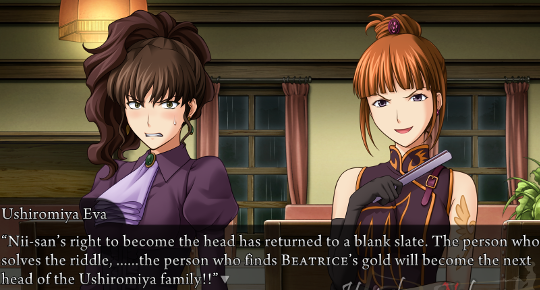
I am starting to doubt it’s Lambdadelta in her head? Why would Lambdadelta want this?
Anyway, Eva says they should go and ask Kinzo directly. Krauss and Rudolf agree that’s a good idea; Rosa expresses some doubt and Eva yells at her. Encouraged by young Eva, she literally tells Rosa to die. Rosa backs down. Only Natsuhi still doubts. ‘Young Eva’ keeps saying various family members should die forever. No, this is clearly Lambdadelta.
Kyrie stays behind, and the rest of the adult Ushiromiyas bustle off to talk to Kinzo. Well, the usual rule seems to be that all but one adult Ushiromiyas die in the first twilight. Maybe this time Kyrie will be our survivor? But I expect the ‘young Eva’ plot to last longer than this so probably not.
The camera stays with the kids, Kyrie and Nanjo. Jessica and Battler agree that their parents are a bunch of greedy ‘shitheads’ (to quote Battler). Nanjo, Kyrie and George encourage a little restraint. And Maria says they all have to ‘believe’ or the happiness will go away. Believe what? Believe in the promise they made, I guess.
Anyway, she mentions Beatrice, which leads to the usual plot point: asking Maria who gave her the letter. Beatrice, of course. Kyrie asks for more detail and we hit a chapter break. (I wish Kyrie’s voice acting wasn’t broken.)
The new chapter is called The Witch’s Written Challenge. We learn Kinzo would not answer. The parents came back and forcefully interrogated Maria, unsatisfied with ‘Beatrice’ as an answer. (Interesting that, since Beatrice has gone back to not showing herself openly, the ‘19th person’ debate has resumed, though the narrative thankfully doesn’t seem inclined to dwell on it too long).
We quickly skim over familiar ground in summary. The kids all go back to the guesthouse. With Maria asleep, they agree that a 19th person is unlikely, and Kinzo probably orchestrated it. But they agree to play along with the Beatrice narrative rather than upset Maria.
Jessica starts to wonder if there really is a ‘Beatrice’ living on the island.
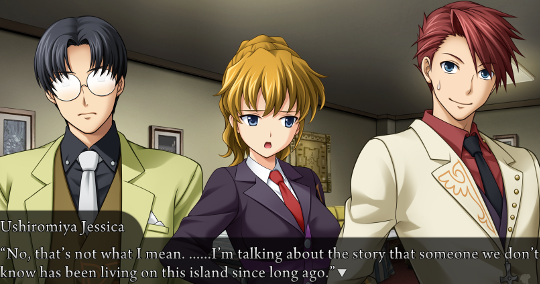
She might, Jessica says, have been hiding in the forest. I remember bringing that possibility up back in game 1 but the characters all assumed a 19th person would have to have arrived alongside them; in game 2 it was moot since Beatrice showed her existence openly. Jessica’s suggestion is accentuated by a highly dramatic thunder crack.
Back to the adults. They have been persuaded by Kinzo’s lack of answer that he’s put the headship up for anyone to grabs. Eventually they decide to take a break from bickering. The game makes a big deal about them sending for water.
They start speculating on where the ‘19th person’ would be sheltering from the rain. Hideyoshi brings up mystery novels. Natsuhi wastes no time in pointing the finger at the ‘one winged eagle’ servants Kanon, Sayo and Genji. Krauss agrees that it was surely one of the servants; Rosa doubts.
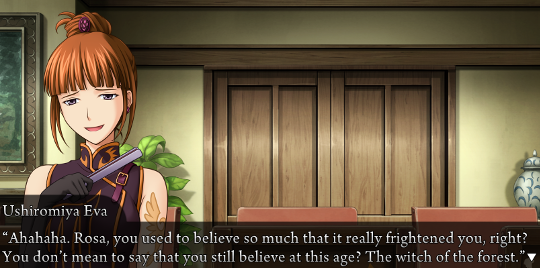
Nearly everything Eva has been in some way related to their childhoods. I am pretty sure we’re supposed to notice that. Anyway, we see a first-person thought from Eva: she had wished Beatrice did exist, but never seen her.
They start speculating that Kinzo had a secret mistress living either in a secret room in the mansion, or in another secret house somewhere on the island. Apparently Kinzo’s unnamed wife used to search for it when Kinzo was away. The concept of the ‘devil’s proof’ comes up once again.
They agree it’s most prudent to proceed on the assumption of a 19th person. Are we finally going to have one where there aren’t wild accusations? Probably not.
As further evidence, they consider that Kinzo used to mysteriously disappear from time to time, at which point their mother would demand the servants search the house - and never find him.
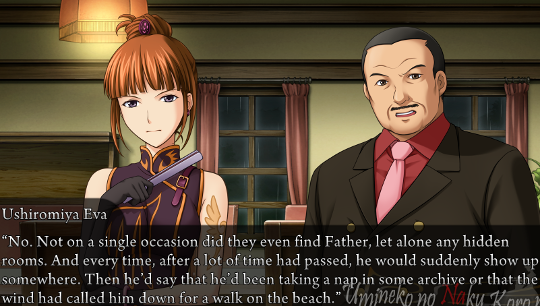
The hypothesis, then, is that Kinzo built a secret mansion in the forest, in which his mistress Beatrice lived, and he would sometimes go to see her there. Krauss says he once tried to follow, but Kinzo was very wary about anyone watching, and he couldn’t.
They conclude that if such a ‘hidden mansion’ existed, it would have to have been built more than 30 years ago, probably alongside the known mansion.
Even Natsuhi is persuaded to go along with this hypothesis.

She insists that it was probably not a relationship with a mistress, just one of ‘gratitude’.
The other siblings (says the narration) then conclude Krauss’s resort plans were a pretext for searching the island for the hidden mansion and its probable gold.
They do all agree that, although the story seems outlandish, it wouldn’t be out of character for Kinzo. Kyrie questions the logistics of it. But, Kinzo does have a lot of resources.
They consider that Beatrice is probably a similar age to the rest of them, and wants to join in the headship battle. They also guess Beatrice already knows the answer to the riddle, since she posed it. Eva suggests, having changed the succession condition in her favour, she will now turn up and “solve” the riddle that she set. But then they decide if that was the case, she’d just steal the gold regardless.
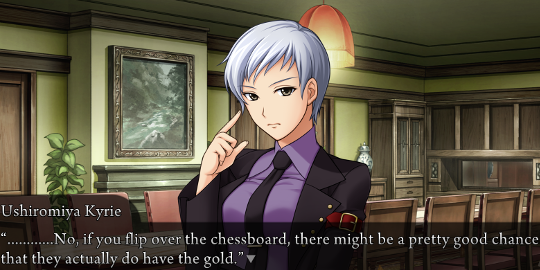
Time for the episode’s first chessboard flip! Thanks, Kyrie.

Kyrie reasons that Beatrice would know they would not happily go along with her ‘winning’ the game she set. But if she had the gold, she could bargain it for the headship.
Natsuhi is like, well we’d never accept that. Kyrie’s like, well, none of us actually have a lot of money left. They argue about that for a bit. But the conclusion seems to be, they totally would accept that. Beatrice’s letter is, they start to suspect, a roundabout way of declaring victory in ‘Kinzo’s game’, i.e., none of you found the gold, I have it, and I’m going to buy the family name.
But Kyrie isn’t satisfied…
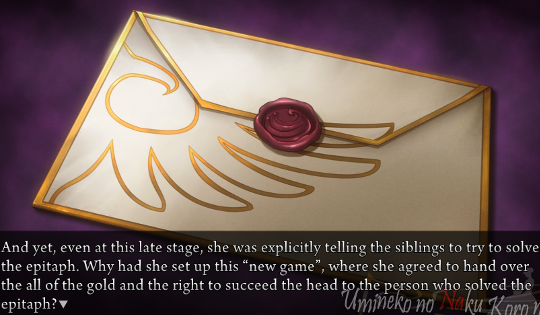

It was a heavy board.
Kyrie’s conclusion is that Beatrice would only challenge them this way out of arrogance. In which case, they might still win - by solving the riddle.
I have to wonder… the adults and children are moving very quickly, if in a somewhat indirect way, to the need to solve the riddle. I can’t help but suspect that this isn’t entirely ‘natural’, but perhaps Bernkastel is subtly pushing things in that direction. Though, Lambdadelta seemed to have the same goal, for some reason (to help Beatrice’s miracle by increasing the odds?)
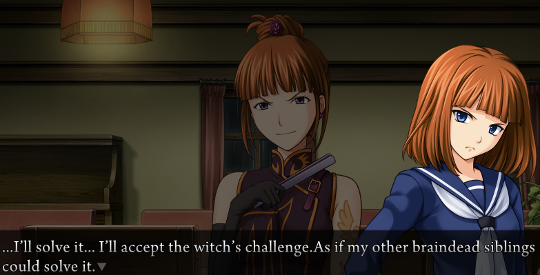
Young Eva isn’t necessarily Lambdadelta, I realise.
The next chapter is called Possibility of a 19th Person.
We cut back into meta space. Meta!Battler is following along. He says that with the information that there could be a 19th person, he can reject any reasoning that says any action not committed by an 18th person must be magic.
Ronove shows up to offer him tea and cookies. Battler really doesn’t like him.
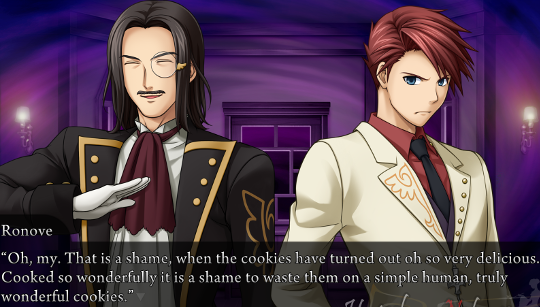
I’ve got to say, the word ‘cookies’ seems really incongruous amidst all this witchcraft and mind games.
Battler complains about Beatrice, and Ronovo agrees. Battler asks why he even works for her, in that case. This should be interesting…
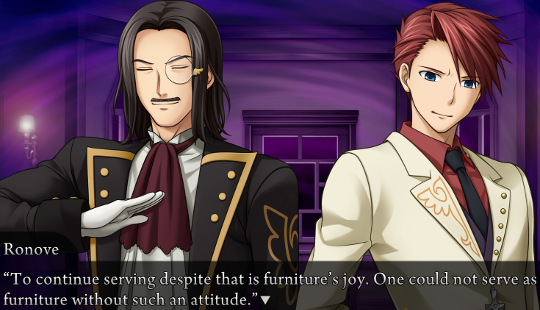
This seems a roundabout way of saying capitalism still sucks even when you’re a Marquis of Hell.
Ronove asks Battler about his thoughts, and we go over the major conflict of the previous game.
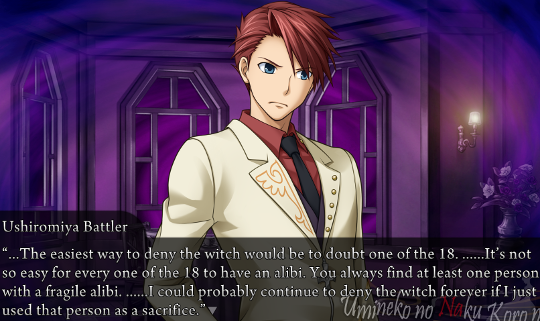
But, time for the catchphrase…
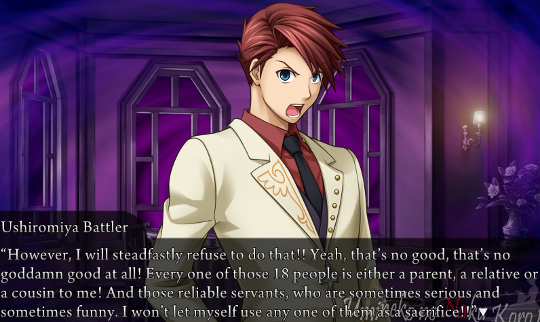
Battler says last time his resolve wavered, and that’s how Beatrice got him. Ronove is suprisingly positive about this acknowledgement of his ‘weaknesses’. He calls the 19th person theory a spear, or perhaps a shield. Battler says that with this certainty about a 19th person - the Mundane Beatrice Hypothesis, to use my silly name - he can blame many events on this person.
But Ronove encourages Battler to anticipate vulnerabilities in this strategy. After all, in the last game, Beatrice exonerated the known 19th person, forcing Battler to go back to the 18.
Ronove proposes an alternative. He questions whether this 19th person really exists.
How appropriate, says Battler, that you should use…
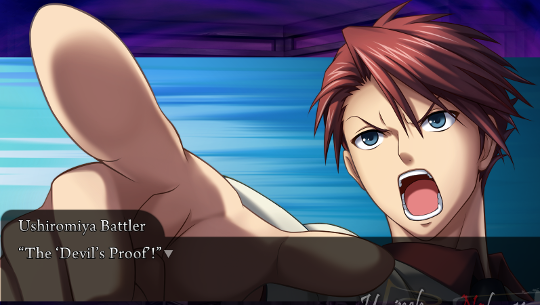
What a good couple of chapters! We’ve had chessboard flips, ‘it’s no good, it’s no goddamn good at all’, and a big finger point all in one post.
Battler spends a while gloating about this new strategy…

There’s a crucial vulnerability, though. If Beatrice was to assert in red that ‘there are only 18 humans on the island’, Battler’s whole strategy would collapse.
Ronove flatters Battler, saying it’s a wonderful move. He asks if he can make another move while Beatrice is absent (…where is she?). Sure, says Battler. Ronove reaches for ‘Hempel’s Raven’. I didn’t know it by that name, but I believe something related came up in a philosophy of science lecture.
The Raven Paradox suggests that if seeing a black raven is evidence for ‘all ravens are black’, then seeing a non-black non-raven such as a green apple is evidence for ‘if something is not black, it is not a raven’ which is logically equivalent to ‘all ravens are black’. But, Hempel says, this is kind of silly, why should an entirely unrelated thing tell you anything about ravens?
I hate to say it, but I’m pretty sure Bayesianism solves this one trivially. However, given this post is quite long and it will take some LaTeX formulae, I’ll discuss that in an addendum. The short answer is that seeing a non-black non-raven is evidence that all ravens are black, but it’s much much weaker evidence than seeing a black raven. Let’s see how Ronove uses it.
Beatrice comes back.
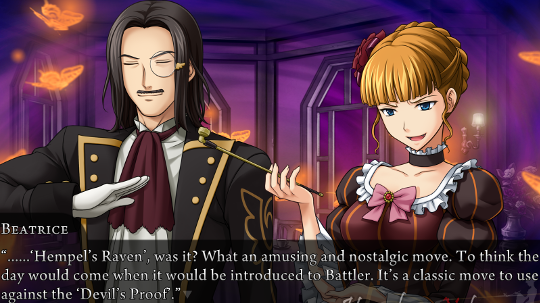
Apparently hypothesis chess (as I’m going to call it) is a common game for witches and devils? Enough to have standard strategies?
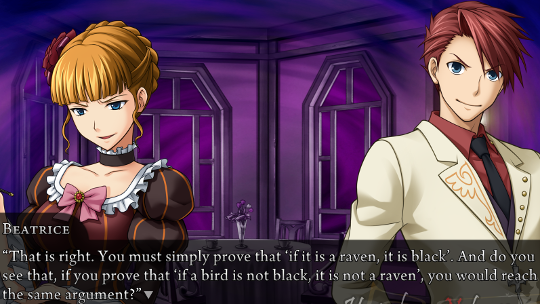
I haven’t read a story with this many lectures on epistemology since I suffered the beginning of HPMOR… at least Umineko won’t try to make me a cultist, I hope.
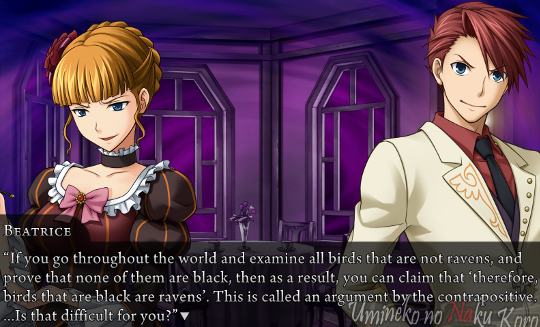
This is wrong. Argh. Beatrice. That would prove ‘if it is not a raven, it is not black’ which is an entirely different statement to ‘if it is not black, it is not a raven’. You’d have to examine all the birds that aren’t black, and show that none of them are ravens. This is going to really bug me. Get your logical statements right please.
Battler can’t follow it. Come on Battler, have you never learned about probability? …why would he I guess. They go over a simpler example, with a more constrained possibility space, and don’t make any other blatant errors.
Battler brings it back to the problem at hand. Beatrice says, if Battler is saying “if it’s not one of the 18, it must be a 19th person”, then she can say “if it’s not by a 19th person, it’s one of the 18″. True, and in fact that’s exactly what she did last time, so I’m not sure why we’re going back over this familiar ground. Also, except insofar as it uses contraposition, this doesn’t really relate to Hempel’s Raven ‘Paradox’, which is about inference rather than deduction.
They spent far, far too long explaining contraposition for a point they’ve used implicitly in the previous game.
Of course, this relies on Beatrice being able to prove no 19th person could be involved. Beatrice and Ronove go on to provide more examples.
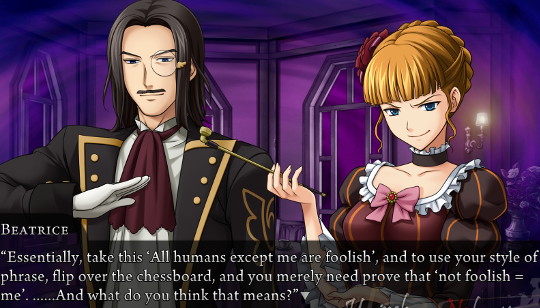
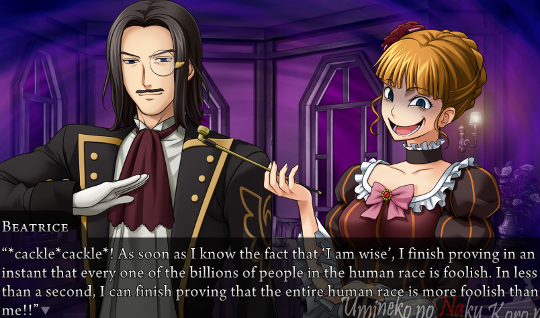
This is very sloppy - embarassing, honestly. Using an equals sign for implication is bad notation. You’d need to prove $$\lnot \text{foolish} \implies \lnot (\text{human}\land \lnot \text{me})$$and if your domain of discourse is limited to humans, i.e. \(\text{human}\) is true, this reduces to $$\lnot \text{foolish} \implies \text{me}$$But what Beatrice is suggesting is that you’d prove $$\text{me} \implies \lnot \text{foolish}$$which obviously wouldn’t get you anywhere at all.
Literally ten seconds looking at the Wikipedia page on contraposition would show the difference between contraposition and inversion.
“If something is not a bat, then it is not a mammal.” Unlike the contrapositive, the inverse’s truth value is not at all dependent on whether or not the original proposition was true, as evidenced here. The inverse here is clearly not true.
I don’t know if we’re supposed to recognise that Beatrice is really bad at logic, or if the author really thinks this argument works.
Even if you didn’t recognise the flaw in the logic, the simple observation that anyone could “prove” they are the only non-foolish person would show this argument is flawed. Come on, Battler. You’re more sensible than this.
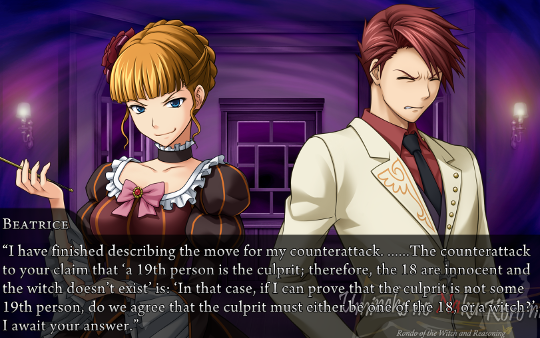
This, at least, is sound, even if the surrounding discussion was wrong in a lot of ways. But it depends on that premise - ‘the 19th person didn’t do it’ - being provable.
Battler comes up with a qualifier: it’s not enough to prove a specific 19th person is not responsible, but Beatrice must prove any possible 19th person is not responsible.
Beatrice is like, sure, I can do that. Remember my red text? She gloats, expecting him to panic. Battler is surprisingly calm. He asks her to give him something in red.
Battler notes, correctly, she can’t use red text to say ‘the culprit was one of the 18′ without saying it wasn’t a witch.
Of course, she could still deny in red the existence of more than 18 people. And as Battler observes, she could still say there are \(n\) people on the island, and it wasn’t one of those \(n\). That would make her win at once. So he’s trying to call her bluff - assuming it is a bluff. If she won’t take those win-instantly moves, he’s all but guaranteed the existence of one or more extra people.
Battler makes a really grandiose soliloquy comparing the red text to a sword fight. He suggests he’s leaving a deliberate ‘weakness’ to bait Beatrice.
I can’t believe we’ve had all this and nobody is even dead yet.
So Beatrice hesitates to make a statement in red, and Battler demands she repeat ‘there are only 18 people on the island’. He tells her what a disadvantage that would be for him. And Beatrice ultimately declines.
How interesting…
Battler follows up by giving a specific accusation: that Beatrice is indeed Kinzo’s human mistress, living in a hidden mansion on the island.
Battler asks her to repeat ‘there are at least 19 people on the island’. This seems like an odd thing to ask: she could decline at no loss even if it’s true. …ah, but if she can’t confirm a 19th person, her contrapositive argument wouldn’t even be relevant.
Battler psychs himself up with a strange metaphor…
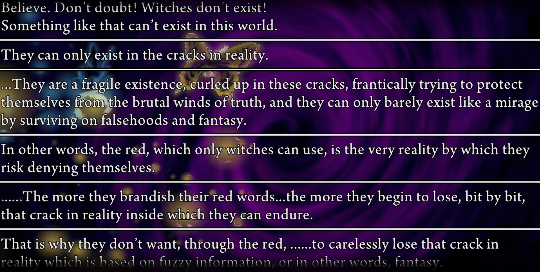
This seems to admit some sense of witches’ existence, but I guess if Beatrice is considered a figment of Battler’s imagination or something… what a cop-out that would be.
Beatrice ultimately declines to confirm a particular 19th person. She says Battler will soon discover why.
I predict Beatrice’s next move will be to seal off the 18 somehow? Ensuring that any of the hypothetical extra people are irrelevant.
Anyway, Beatrice allows Battler this ‘small victory’, and Ronove applauds - but Battler can’t help but wonder if he’s being led into a trap. There’s a bit of a lull.
Then Beatrice says it’s time to reveal why she declined to limit the people on the island to 18. It’s possible that at least one is already dead?
Something else. Beatrice says Rosa will explain.
Back to the narrative. The adults are agreeing to something. I think we’ll leave it there for now.
Comments